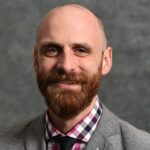CETR to Sponsor Learning Community to Explore Culturally Reflexive Practices in Teaching
Faculty and staff will soon have an opportunity to join a special learning community to explore culturally reflexive practices in their discipline, be they pedagogical, supervisory and/or clinical.

Cultural reflexivity is a broad praxis that challenges direct service providers to critically examine ways to de-colonize their professional services and infuse them with equitable and justice-oriented practices. For example, cultural reflexivity breaks down traditional hierarchical labels such as “client” and “patient” and identifies them as stakeholders with expertise that can be applied in mutually co-constructed practices serving collective community needs.
Dr. Noah Potvin, assistant professor of music therapy with a joint appointment in both the Mary Pappert School of Music and the School of Nursing, organized the learning community as part of the Gaultier Fellowship Program.
Gaultier Fellows work closely with Duquesne instructors and students by sharing successful community-engaged teaching strategies and best practices, and by serving as strong advocates for the benefits that the University’s community-engaged programs provide.
The learning community will participate in a series of trainings and interactions throughout the academic year as outlined below:
- September through November 2020: Stakeholders will critically interact with diverse readings, art forms and other resources that introduce cultural humility and cultural responsivity as both intellectual constructs and lived ideas.
- December 2020 through January 2021: Stakeholders will participate in a self-analysis using Bronfenbrenner’s Ecological Systems Theory as a working model to identify the various dimensions of their cultural location and explore how those dimensions have informed their prevailing self-concept, professional identity and philosophy of practice.
- February 2021 to March 2021: Stakeholders will use this same analytic method to analyze a community’s cultural location(s) and explore ways in which the emergent insights about “self” and “other” can inform future service provision.
Space is limited. For more information and to become a member, contact CETR.
